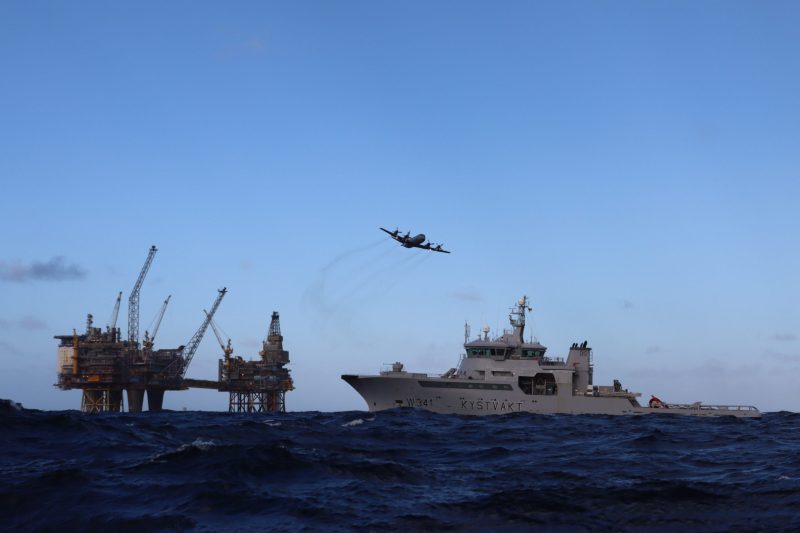International news reports that a mysterious yacht sailing from Rostock may be behind the suspected sabotage of Russian pipelines in the Baltic last fall have won media attention in Norway. The reports are apparently viewed as more credible than another one earlier this year that blamed the sabotage on the US with help from Norway, but was mostly ignored.
The massive explosions of the Nord Stream 1 and Nord Stream 2 pipelines, which carried Russian gas to Europe, grabbed headlines in Norway as they did around the world. Russia, which had invaded Ukraine seven months earlier, quickly emerged as the prime suspect because it was upset over how NATO countries and most of the rest of Europe were supporting Ukraine. So upset, reasoned Russia’s accusers, that it was willing to blow up its own pipelines and make the war-related energy crisis even worse.

The explosions raised immediate security concerns around Norway’s own pipelines, which suddenly were viewed as potential targets. Russia had earlier boasted of its subsea military capabilities, while Russian ships suspected of spying were sailing around the North Sea. Norwegian fighter jets, military helicopters and naval vessels were sent out to patrol Norway’s offshore oil and gas platforms and monitor their pipelines, with back-up from NATO allies.
Investigations into the explosions were launched by Sweden and Denmark, since they occurred in their territorial waters, and by Germany, which had backed the pipeline project with Russia and been supplied with Russia’s gas. German media including newspaper Zeit, TV channel ARD and SWR TV, reported last week that German investigators had zeroed in on a chartered yacht that sailed from Rostock in early September. On board were six people believed to have used false passports. They included a captain, two divers, two diver assistants and a doctor.
The yacht reportedly sailed in the area off the Danish island of Bornholm where the pipelines ran under water. Those chartering the yacht reportedly have ties to Ukraine, with The New York Times reporting that a “pro-Ukrainian group” was involved. There is, however, no evidence that the group has any ties to the Ukrainian government, which in turn has denied any involvement.
The German media also reported that when the yacht was delivered back to its charterers in Rostock, German police found signs of explosives on board. German officials have later confirmed much of what’s been leaked to the media even though neither the Germans, Danes nor Swedes have concluded their investigations.
Meanwhile veteran US journalist Seymour Hersh reported something entirely different earlier this year. The Pulitzer Prize-winning Hersh is best known for revealing the My Lai massacre during the Vietnam War, when he worked for The New York Times himself in 1969, and, in 2004, how US officials abused Iraqi prisoners.
Now age 85, Hersh reported on his Substack blog that the US was behind the Russian pipeline sabotage. Citing a lone anonymous source who allegedly helped plan such an operation, Hersh wrote that explosives were placed on the pipeline by American divers during a NATO exercise in the area in June of last year. Three months later, Norwegian aircraft allegedly dropped a remote-control device into the waters that set off the explosives on September 27.
“Pure fiction,” retorted US officials, “false and complete fantasy,” while Norway’s foreign ministry told Norwegian TV2 that Hersh’s report was “selvsagt bare tøv,” the equivalent of “pure nonsense.” Danish Foreign Minister Mette Frederiksen joined in by warning against “conspiracy theories,” which is how she evaluated Hersh’s report.
Hersh hasn’t offered any documentation for his report, which also claimed that the sabotage was carried out under orders from US President Joe Biden, who had claimed at a press conference last February (before the war began) that the US would halt gas connections between Russia and Germany if Russian forces invaded Ukraine.
Hardly any Norwegian media picked up Hersh’s initial report, on the grounds it lacked documentation or seemed literally incredible. Journalisten, which reports on Norwegian media for the country’s professional journalists’ organization Norsk Journalistlag (NJ), published an article about how editors were debating how or whether to respond or pick up on Hersh’s report, but few did. Oslo-based newspaper Klassekampen was among the first to write a column about it on February 10, which referred to Hersh’s report but concluded that “we don’t know who blew up Nord Stream, not after (reading about) Hersh’s anonymous source either.”
Klassekampen further noted that Hersh has been criticized for publishing “thin” reports earlier, but also that many right-wing populists and social democrats in northeastern Germany (where the piplelines terminated) think the US was behind the sabotage. The US had sought to halt Nord Stream with sanctions. Norway, meanwhile, has profited greatly on sales of its own gas to Germany and elsewhere in Europe after Nord Stream was forcibly shut down.
Swedish and Danish investigators, meanwhile, have informed the UN Security Council that they still have no results to report. Russia’s ambassador to the UN wants the UN to launch its own international investigation of the sabotage, having little faith in those currently underway. Russia also responded negatively to the news that a chartered yacht may have been involved, calling that little more than a diversion tactic.
Russia’s ambassador to Norway, Teimuraz O Ramishvili, wrote in newspaper Aftenposten this week that Norway was just “a brick in the NATO-centered security system.” He claimed Norway’s support for Ukraine and anti-Russia sanctions, along with “military preparations” at the Russian-Norwegian border, have all but “destroyed the architecture” of the two country’s “bilateral relation” after a thousand years of being good neighbours in the far north. He pointed to a potential “conflict between Russia and NATO, with all the consequences that could have for Norway.”
He made no mention of the pipeline conflict, even though his higher-ups have, and implicate Norway. “Russia is pointing to us as responsible for the sabotage,” observed commentator Jo Moen Bredeveien in newspaper Dagsavisen, who thinks it all “brings the war closer … and that’s frightening.”
NewsinEnglish.no/Nina Berglund

